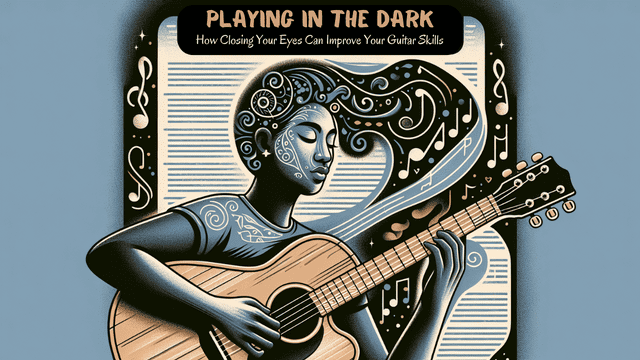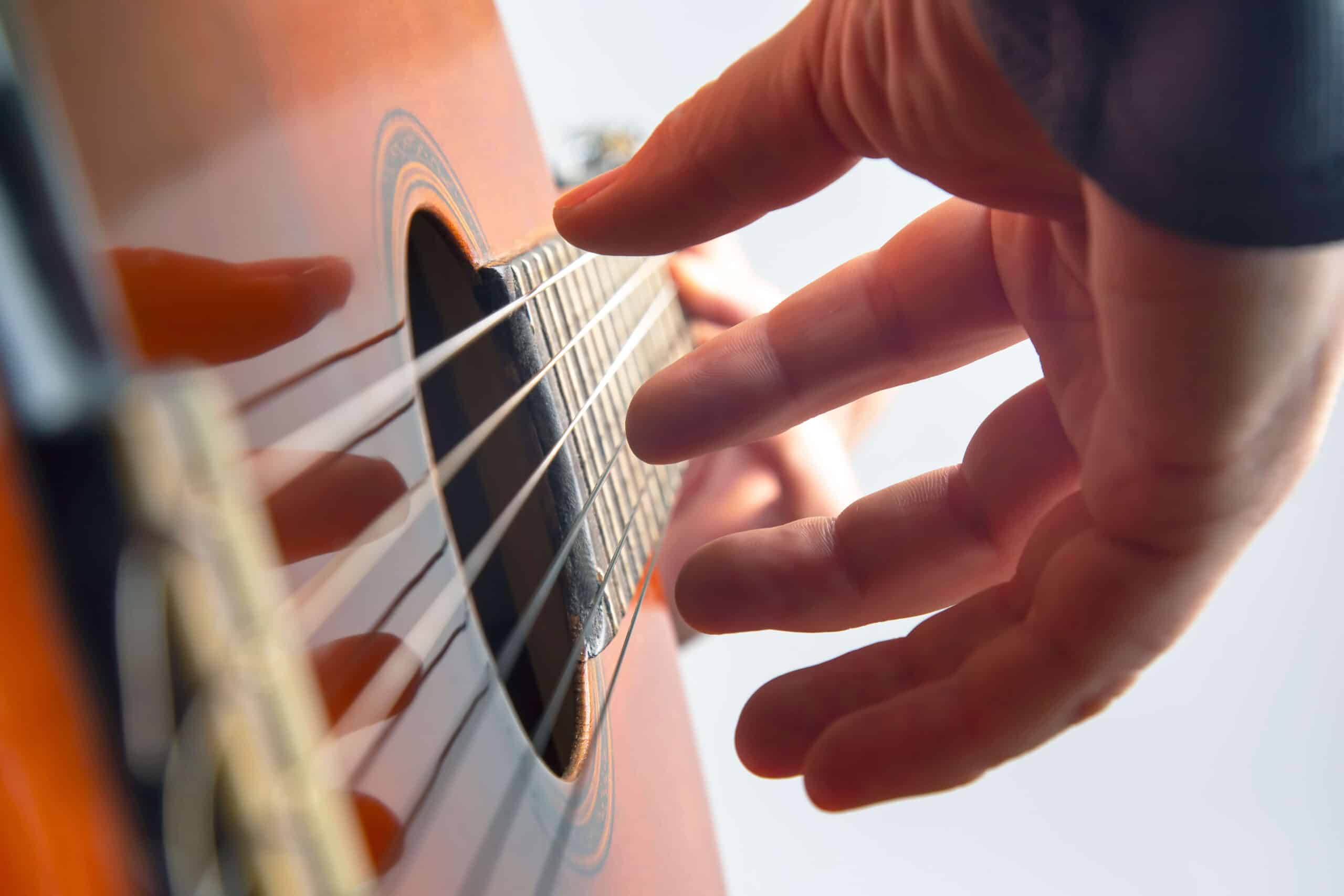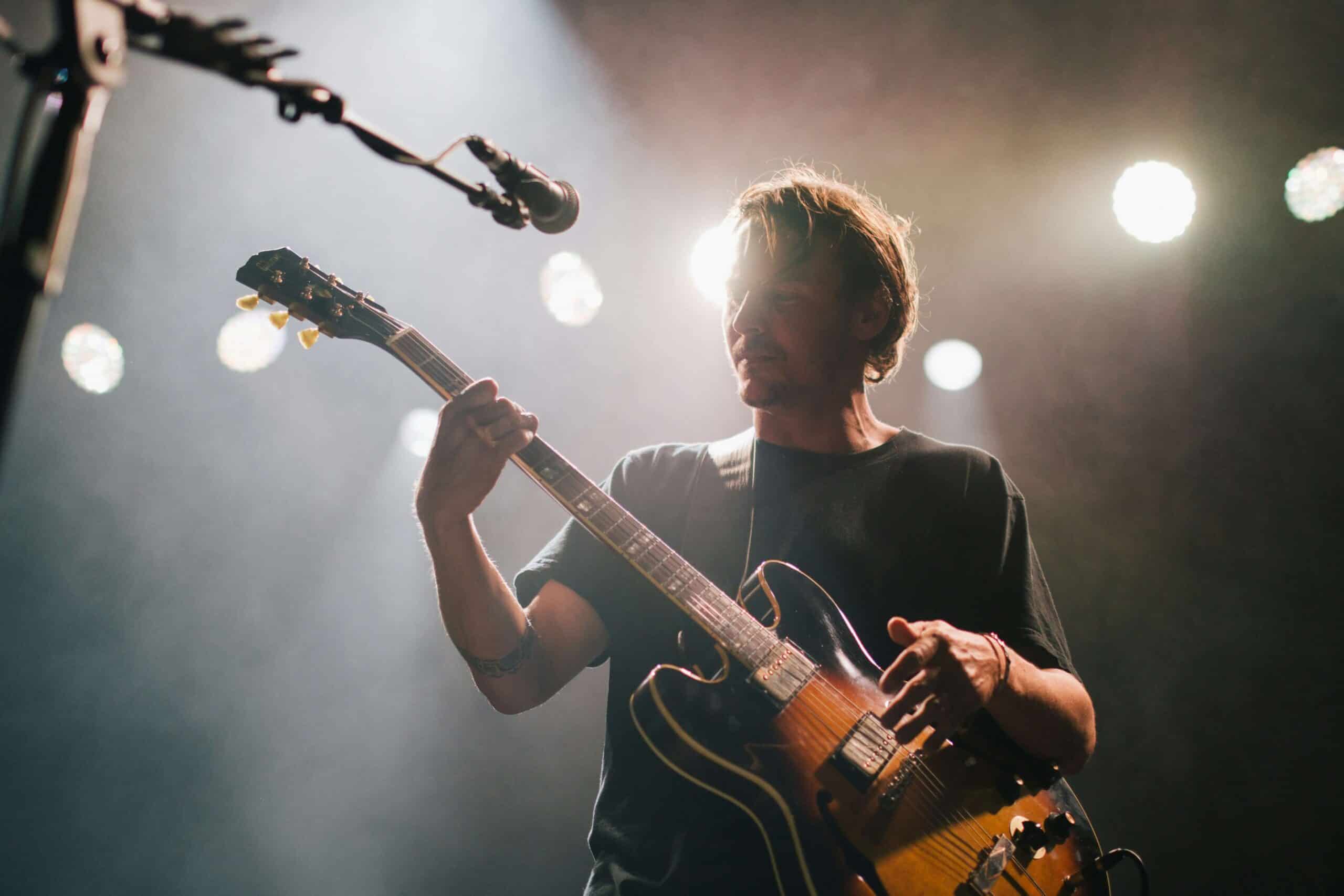
One technique I found to be surprisingly effective is closing my eyes for a portion of my practice time. I know it sounds crazy when you're just learning fretboard geography. But limiting vision pushes your other senses, like touch and hearing, into high gear.
Famous guitarists actually used this technique. Masters like Jeff Healey could shred epic solos on dark stages by feeling the strings and listening intently.
Without sight, your brain focuses more on the tactile sensations in your fingertips, pressing strings and sliding along frets. Your ears also guide you by monitoring pitch and tone. It heightens sensory abilities beyond just visuals.
The frustration you initially feel while practicing blind is normal. Work through it by taking things slowly. Before long, your muscle memory will kick in, and your fingers will land more accurately without peeking. Your listening skills will also improve which will help with orientation.
It All Feels Foreign At First

I'm not going to lie to you. The first time I tried playing my guitar without peeking, it felt completely bizarre and scary. My left hand stumbled around the fretboard. Meanwhile, my right hand was strumming a bunch of the wrong strings. Talk about frustrating!
Most of us are used to staring intently at those chord diagrams, constantly checking our finger placement. Take that visual guide away. Fat chance! At least, that's what I thought. But I forced myself to take a deep breath and continue fumbling through my favorite song with my pick and fingers. And the craziest thing happened after a few minutes. Those clumsy hands and ears slowly started to sync up.
Trust Your Tactile Senses

With sight eliminated from my guitar practice, I had no choice but to rely completely on the tactile feel of fingertips pressing strings, the slight ache in my fingers, and the raised bumps of frets sliding under my skin. It was all so magnified! Colors and shapes didn't distract me anymore. I honed my focus directly on the physical and vibrational.
And because I went into ultrasensory mode, I quickly learned to use those textures and feels to orient myself. After frequent, regular practice sessions with my eyes closed, I began to develop a kind of map in my neural pathways. Visual confirmations were no longer needed. My hands instinctively landed on target.
Let Your Ears Be the Spotlight
But here’s the even crazier shift that happens when you practice guitar blind: your ears take over the lead role! It's wild how much your auditory senses compensate when vision is unavailable. And soon, this confidence in your listening will guide your fingers.
Little subtleties, like a note buzzing slightly or adjacent strings being accidentally strummed, would go undetected before. But now, those slight audio imperfections stick out immediately, so technique can be tightened up in the moment.
Most importantly, interval recognition skills between frets take a huge leap forward. You begin associating those incremental sound disparities when fingers shift up or down strings with the actual tangible movements. Fretboard geography visualized through sound really accelerates your playing!
Break Free from Vision-Based Habits

When we first start practicing songs on guitar, we cement all these patterns and muscle memory shortcuts based completely on sight without even realizing it. Visual familiarity drives so much of what shapes our playing. Where we look determines where we go.
But when vision is completely removed from the equation, those entrenched habits fade away out of necessity! Physical limitations imposed by seeing the fretboard suddenly vanish. Hands are free to find alternate, untraveled pathways that feel smoother and more efficient. Without visual reminders, signature licks sound new and exciting.
Blind practice sessions let muscle memory rebuild independently from the eyes. Repetition doesn’t reinforce stale visual vocabulary anymore. Expect fresh creative breakthroughs as you fumble around excitingly unfamiliar territory!
Pinpoint and Correct Technique Defects
Here’s another advantage I noticed from minimizing visual reliance: it quickly exposes areas needing skill improvement! Common weaknesses like inefficient left hand movements, uneven right hand picking, fret buzz, and unbalanced dynamic control are highlighted when everything goes quiet and dark.
It’s incredibly hard to detect poor technique habits when you’re staring straight at the cause. But remove sight, and the sound and feel of those deficiencies become impossible to ignore. Without self-correction from vision, the ears take over error alert duty!
Once uncovered, you can then target those flaws and make the necessary corrections.
So next time you’re struggling with chord transitions or rhythms sounding sloppy, try closing your eyes. It can work magic by diagnosing issues so they can be remedied quickly.
Perform Onstage With Confidence

Gigging guitarists know things don’t always go as planned when performing live. But practiced blind musical wizards like Jeff Healey wouldn’t even flinch if the power cut out in the middle of a blistering solo. He’d just keep the melody pouring out until glasses shattered!
This poise under poor visual conditions only comes from repetition. By frequently removing reliance on sight when practicing, you simulate struggling spotlights and prepare an instinctive reaction. Soon, darkness is just another platform to own!
Adding Sightless Practice to Your Toolkit
I encourage you to start practicing some exercises or songs with your eyes closed. Consider this an additional tool in your kit of practice techniques. At first, you'll probably feel uncomfortable and make more mistakes. Go slow, be patient, and push through the frustration.
If it helps, let those guitar greats who played incredible music without the benefit of sight inspire you. The payoff? With regular blind practice, your ears and muscle memory will steadily improve until you can visualize the fretboard by sound and touch alone.
Don't Miss Out!
Join me at Real Guitar Success and enjoy step-by-step lessons starting from beginner to playing up a storm. You’ll also get your guitar questions answered, connect with a community of great people like yourself, and much more.
Don't miss out. Discover how much fun learning and playing guitar can be.
